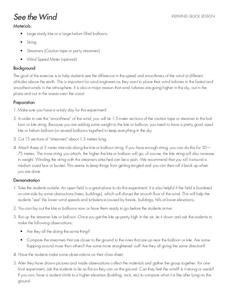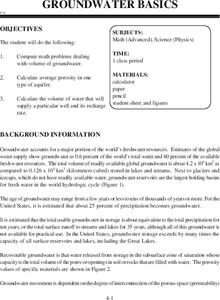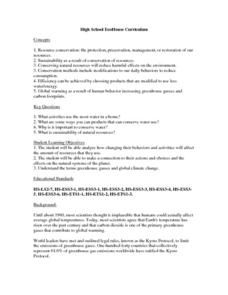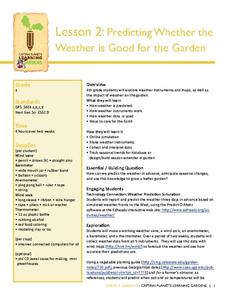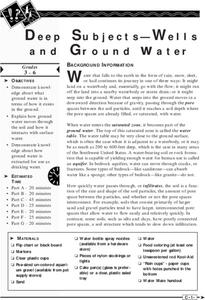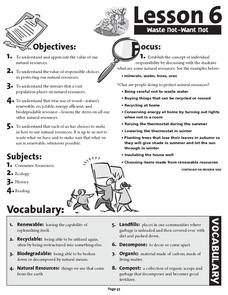Curated OER
An Environmental Puzzle: The Carbon Cycle
Middle school science stars examine fuels and energy with a variety of activities. They begin with a KWL chart, read an informative passage, and then complete a puzzle. The puzzle itself is included. Cleverly, each piece corresponds to a...
Curated OER
Environmental Benefits of Recycling
Fourth graders understand the benefits of recycling. In this recycling literacy activity, 4th graders read an article and identify the main idea. Students understand the process of transfer to the landfill and discuss how recycling helps...
Curated OER
Meet the Tiger
Here is an excellent lesson tigers that has a research component. Integrated into the lesson is the premise that God created animals and the human responsibility to care for them. At learning centers students visit various Websites and...
Curated OER
See The Wind!
Young scholars learn about wind at different altitudes above the earth. For this wind lesson plan, students use kites or balloons with attached streamers to observe the wind speed, wind turbulence and shear at different elevations. Young...
Curated OER
Planets in our Solar System
A wonderfully designed, and very thorough lesson plan on the planets in our solar system. Designed for third graders, this lesson has learners use technology and multimedia tools to research, explore, and create information about the...
Center Science Education
Paleoclimates and Pollen
Demonstrate for your earth scientists how plant pollen of the past has become part of sedimentary deposits, providing clues about ancient climates. Then give them simulated sediment layer samples to analyze for different types of paper...
Science 4 Inquiry
Temperature of Inner Planets
Mars, Earth, and Venus contain atmospheres that generate weather. Young scientists explore the temperature of inner planets. They create a model simulating the greenhouse effect before researching and answering guided questions to...
Curated OER
E.T., Are You Out There?
Research the necessary components of a planet that supports life after reading the article "All of a Sudden, The Neighborhood Looks a Lot Friendlier" from The New York Times. After finding their information, middle and high schoolers...
Captain Planet Foundation
P is for Poppies
Explore the way local farming and rationing helped the war effort in World War I with a lesson plan on gardening. After learning about trench warfare, reading "In Flanders' Field" by John McCrae, and studying poppies, kids discuss the...
Curated OER
Groundwater Basics
Groundwater is an essential natural resource, not to mention a fascinating topic to study. Here is a series of twelve amazing lessons on the water source and how we use it in our daily lives. Concepts require higher math and physics...
Curated OER
High School EcoHouse Curriculum
How has the level of carbon dioxide changed over recent years, and what is contributing it? Groups work together to research and present their findings in a creative way. Also built into the lesson is a visit to a sustainable house, but...
Captain Planet Foundation
Rotting Away
What happens at the end of a plant's life cycle? Show kids the natural way that plants show that they're decomposing, as well as the importance of compost, with a activity about living organisms. After reading Log Cabin by Anne...
Captain Planet Foundation
Which Plant Is Which?
Learn about dichotomous keys, plant identification, and how to care for the planet with a lesson that includes several hands-on and innovative activities. Kids go on a plant scavenger hunt and classify the plants that they find...
Captain Planet Foundation
Predicting Whether the Weather is Good for the Garden
Can your class predict the weather? Show them how they can come close with a instructional activity about creating weather instruments, including weather vanes, barometers, wind socks, anemometers, and thermometers. Kids research weather...
Curated OER
Deep Subjects - Wells and Ground Water
Here is a phenomenal lesson plan on ground water, wells, and aquifers. Young geologists study how water exists underground, how water moves through the soil, and how water is extracted to be used as drinking water. Some excellent...
Forest Foundation
Waste Not - Want Not
Recycling is the focus in the sixth of a nine-instructional activity series devoted to forest ecosystems. Class members read an article about the responsible use of natural resources and ways to reduce land fill.
Howard Hughes Medical Institute
Human Feet Are Strange
Feet are neat! So, if you've already walked the path of examining animal footprints with your class, put them in the shoes of early humans! A well-designed lesson incorporates video, discussion, and hands-on learning to demonstrate how...
University of Colorado
Terra Bagga
Earth's magnetic poles switch positions about every 200,000—300,000 years. In the activity, groups create a planet with a magnetic field. Once made, they use a magnetometer to determine the orientation of the planet's magnetic field....
University of Colorado
Strange New Planet
The first remote sensors were people in hot air balloons taking photographs of Earth to make maps. Expose middle school learners to space exploration with the use of remote sensing. Groups explore and make observations of a new planet by...
NOAA
Plankton
Dive into the world of plankton. The 17th installment of a 23-part NOAA Enrichment in Marine sciences and Oceanography (NEMO) program introduces different types of plankton. Young scientists then use what they have learned to classify...
Curated OER
Erupting Volcanoes!
Students examine the causes of earthquakes, volcanoes, and floods, and explore how these events shape the surface of the earth. In this erupting volcanoes lesson, students create a volcano model of their own, make observations about how...
University of Colorado
Space Travel Guide
Neptune takes 164.8 Earth years to travel around the sun. In the fifth of 22 lessons, young scientists create a travel guide to a planet in our solar system. They provide tips for others on what to bring, what they see, and their...
University of Colorado
Using Spectral Data to Explore Saturn and Titan
Saturn's rings are made of dust, ice, and solid chunks of material. Individuals use spectrographs in this final installment of 22 lessons to determine the atmospheric elements. They analyze spectrums from Titan's atmosphere and Saturn's...
Curated OER
What are Metamorphic Rocks and How are They Formed?
Even though the student handouts are not included in the write-up, this activity contains the instructions for terrific activities to use when teaching middle schoolers about metamorphic rocks. First, they compare granite to gneiss and...
Other popular searches
- Earth Science Lesson Plans
- Earth Science Lesson Nevada
- Science Earth Day Lessons
- 5e Lesson Plans Earth Science
- 5e Earth Science Lessons
- Earth Day Science Lesson Plans
- Earth Science Lessons Moon
- Free Earth Science Lessons





